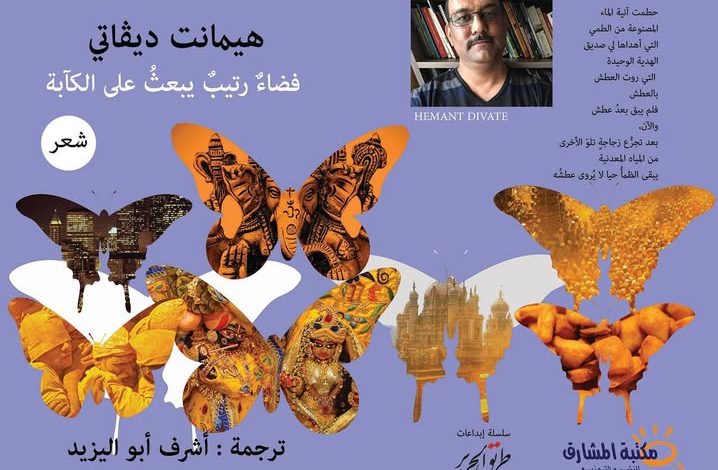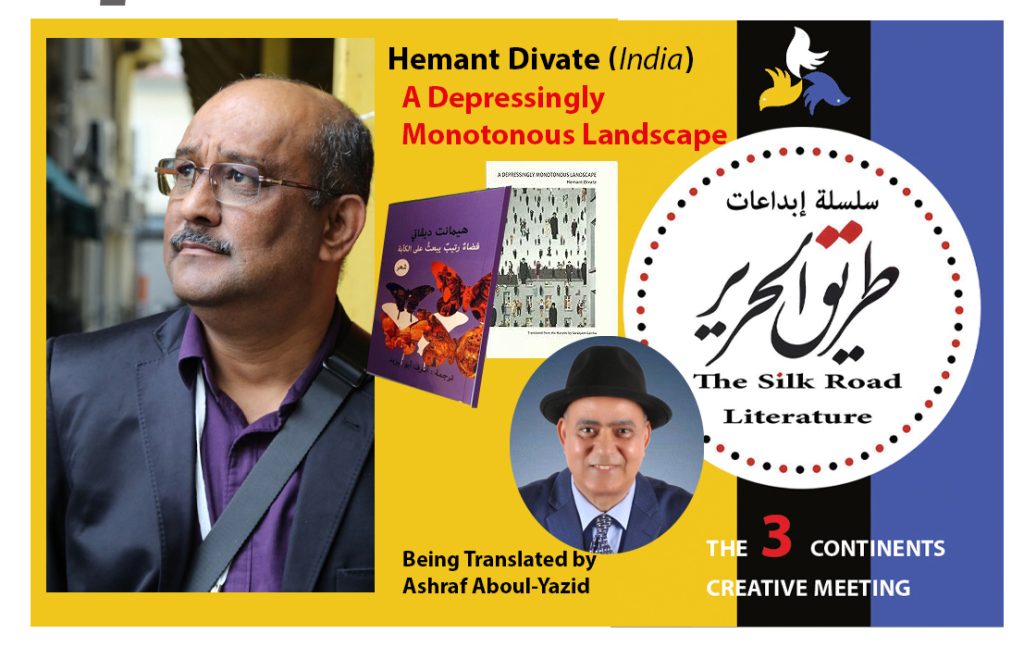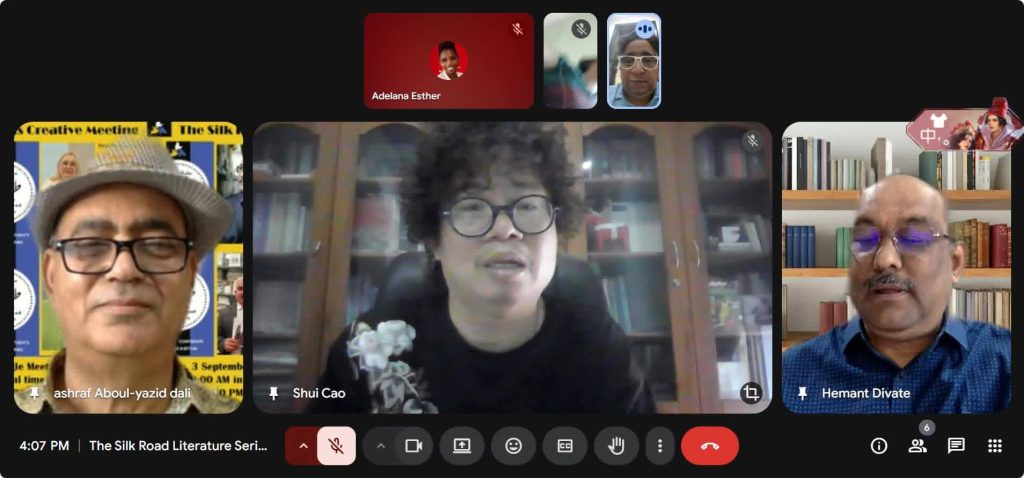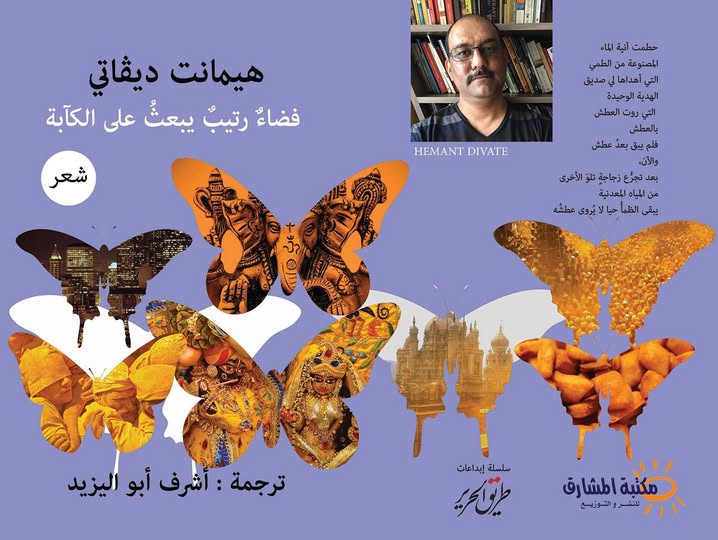
The Silk Road Literature Series hosted its Three Continents Creative Meeting on Wednesday, 3 September 2025. In an hour online gathering, six authors from across three continents presented their works translated into Arabic by their host, the Egyptian poet and novelist Ashraf Aboul-Yazid.
 The creative meeting started with Hemant Divate (India), the author of (A Depressingly Monotonous Landscape); the first ever book published by the Silk Road Literature Series, launched in Cairo, 2016. Hemant Divate is a Marathi poet, editor, publisher, translator and poetry festival director.
The creative meeting started with Hemant Divate (India), the author of (A Depressingly Monotonous Landscape); the first ever book published by the Silk Road Literature Series, launched in Cairo, 2016. Hemant Divate is a Marathi poet, editor, publisher, translator and poetry festival director.
He is the author of eight poetry collections in Marathi. His most recent book in Marathi is Paranoia, which was awarded the Government of Maharashtra’s Kavi Keshavsut Award. Divate’s poems have been translated into more than 36 international languages. In translation, he has books in Spanish, Irish, Arabic, German, Estonian, and Kannada, in addition to five in English. His poems figure in numerous anthologies in Marathi, English and Slovenian.
He is the founder and editor of the Marathi literary magazine Abhidha Nantar. Abhidha Nantar has been credited with providing a solid platform for new poets and enriching the post-nineties Marathi literary scene. Divate is credited with changing the Marathi literary scene through AbhidhaNantar and the Indian English poetry scene through his imprint Poetrywala.
Divate has participated in numerous international poetry and literary festivals around the world. His publishing house, Paperwall Publishing, has published (under its imprint Poetrywala) more than 200 poetry collections. Hemant is the founder and director of the Mumbai Poetry Festival. Hemant lives in Mumbai.
There were two rounds of poetry readings of Divate’s poems, he recited his words in his own mother tongue (Marathi), the host read them in Arabic and architect, poet and translator Mustansir Dalvi read them in English.

Ashraf Aboul-Yazid said:
“Hemant Divate turns to neglected moments and compels them to speak, so that they become, after contemplation, the most essential moments of life — in their sweetness and bitterness, in their purity and filth, in their loftiness and baseness. Thus, the poem plunges us into a journey with the poet, who once confessed to me that this was his most difficult collection. Yet I did not confess to him that it was also his most intimate with the Other, for globalization — which struck India after its relatively late opening-up — shocked the world, and struck us as well. What he speaks of has become comprehensible to us. The names may differ, but the suffering is the same.
Hemant Divate’s poems are like elegies — elegies for a vanished history, for broken dreams, for mental images that have been distorted, especially since the post-independence era of India some seventy years ago. In these recent decades, everything has lost its meaning, even the childhood tales that once colored the evenings in the absence of books. Today, despite the mountains of books, they have vanished.
Trademarks are the clearest imprint of globalization devouring everything, just as it devoured Amitabh Bachchan’s star in a soup-bowl advertisement I once saw in the bustle of Mumbai. Globalization now occupies the most devoted scenes of prayer in temples, dominates the most intimate moments at home, and governs the most ordinary moments in the marketplace.
Everything has fallen under the dominion of brands, as though the human being himself has become nothing more than a commodity sealed in a tin can on the shelves of planet Earth — with a marketing slogan, a price tag, and a prescribed way of life.
I asked myself: Is this confined to India alone? Do I encounter it only in Mumbai? Or have all historic cities become a deformed prey to the ogre of globalization?
Hemant Divate says in part of one of the longest poems in this collection — as if in an unending hallucination:
Today’s the first of July, and it’s about ten. Today’s the first of July, and I’m expecting a child on the first of July. The astrologer has given my wife three auspicious times, and the doctor preferred the fresh mahurat in the morning; it was to everyone’s convenience. There’s no traffic jam at ten on Station Road; in every hospital, at ten, someone’s child is born. Just before ten my mind is flooded with ten thousand thoughts, some being born, some dying, like amoebae. Single cells come to life, then die; my mind’s drainage system is choked. The sonography of my expected child shows the umbilical cord wrapped round its neck. This tightens a grip around my own, and I start to suffocate. A caesarean blade slices me open, a splatter of blood flies into my mind. The blade passes around my neck—snickersnack! A gupti lunges, decapitates me cleanly. A worn-out head of an old tape recorder aggravates, its music rasping through my brain that drips out of holes made by seventeen hundred and sixty needles. The child will be here, screaming or stillborn, snuffing out the mind, or acquitted of homicide of the mind. The child will be here, soon. In my head, bombs go off serially. I am thrown about by a stampeding crowd; I run like mad down a curfewed street—run! Behind me, a mob armed with weapons gives chase. I have set off a riot. Lynchings will start with me. A war will start with me. This ambulance, these fire tenders, stretcher-bearers in white, nurses impassive, all in white. Sirens ring out, terrifying—the sounds of bombs, bullets. Bodies fall like garbage, the garbage that is my own body. Countless women wail, wail until their chests explode; they slap their own faces endlessly. They all look like my wife. A huge looking-glass lies shattered in a large courtyard; every shard reflects a squirming, bloodshot eye, my eye. All around the world my orphaned eyes await the striking of ten. Who will I be at ten? The father of a child? Or the parent of a dead mind? In my mind, it’s about ten, and the entire world stands about me in anticipation.”

The poet also recited his poem “Butterflies”:
“While rambling through the garden of my housing complex, Apropos of nothing, I told a friend: Y’know, these days, we don’t see those small,
Common yellow butterflies any more.
To which, he casually replied:
That brand has been discontinued. “
The six celebrated authors were Hemant Divate (India), Cao Shui (China), Miao yi- Tu (Taiwan), Esther Adelana (Nigeria), Inna Natcharova (Russia), Mexosh Abdullah (Azerbaijan). The Creative meeting took an hour to host the 6 authors, from 10:00 to 11:00 AM (Egypt local time), corresponding to 9:00–10:00 AM in Nigeria, 11:00 AM–12:00 PM in Russia (Moscow), 12:00–1:00 PM in Azerbaijan (Baku), 1:30–2:30 PM in India (New Delhi), and 4:00–5:00 PM in both China (Beijing) and Taiwan (Taipei).
Together, these voices underscore the Silk Road Literature Series’ mission to bridge cultures through translation and shared creativity.



